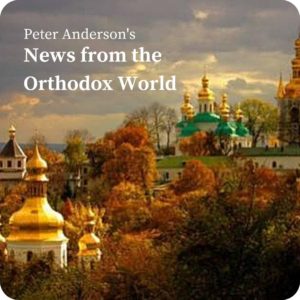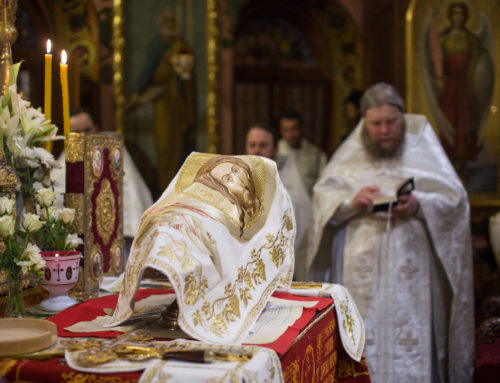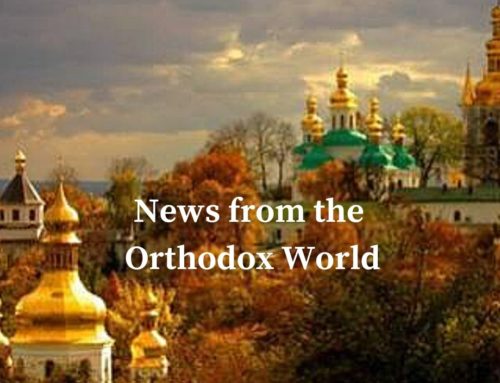Peter Anderson reports from the Orthodox world.
Longstanding reporter of the news from the Eastern Church, Peter Anderson shares our dream of a unified Christianity. His love for Orthodoxy has driven him to this personal mission to share the news of East with the world through his email list. The Urbi et Orbi Foundation is proud to share his efforts and his insights with you.

On March 24, the Russian State Duma, following a third reading, approved a new law, “On the certification of clergy.” https://ria.ru/20210324/dukhovenstvo-1602632541.html The law must now be reviewed by the Federation Council and then sent to President Putin for signature. See https://duma.gov.ru/en/news/28319/ (describing the Russian legislative process in English) The new law requires “recertification” in Russia of clergy who received religious education abroad. Certain exceptions were provided in the third reading. https://ria.ru/20210324/dukhovenstvo-1602632541.html The new law as amended was described by RIA-Novosti in the foregoing link as follows:
The procedure for re-certification of clergy who received their education abroad has also been clarified: Russian clergy who have received a foreign spiritual education will be exempted from certification if they already carry out religious activities in Russia. In addition, Russians who are just receiving or planning to receive religious education abroad, but have not yet begun serving in Russia, will have to receive additional professional education in Russian religious educational organizations after completing their studies. If a confession does not have its own educational organizations in Russia, they will be able to receive additional professional education at the departments of theology of federal universities, the list of which will be approved by the Ministry of Education and Science. Earlier, the head of the Duma committee for the development of civil society, issues of public and religious associations, Sergei Gavrilov, said that the norms of the law would not apply to foreign clergy who arrived in our country to give lectures, since this does not apply to religious activity.
Thus, a minister or priest who in the future comes from a foreign land to serve in a Russian parish must receive additional education and certification in Russia before beginning religious activity in Russia.
However, I found another provision of the new law even more interesting. It provides that a religious organization will be able to leave the structure of a centralized religious organization only in accordance with the charter of the centralized religious organization. https://ria.ru/20210323/gavrilov-1602487921.html As stated by a spokesperson of the legal department of the Moscow Patriarchate today, this “prevents attempts to split the traditional confessions.” https://ria.ru/20210324/rpts-1602714108.html Presumably, the charter of the centralized religious organization, such as the Moscow Patriarchate, can prohibit the departure of parishes, monasteries, or other church institutions from the centralized religious organization without the consent of the centralized religious organization. This law gives the force of civil law to such charter restrictions. This will prevent in Russia anything similar to what happened in Ukraine where some parishes left the UOC-MP to join the OCU. The new law clearly seeks to prevent schisms.
On March 19, Patriarch Porfirije of Serbia gave his first interview to the Croatian media since his recent election as patriarch. The interview was conducted in Belgrade by HRT (Croatian Radio and Television). The entire interview (in two separate videos) and a written summary can be viewed at https://vijesti.hrt.hr/svijet/patrijarh-porfirije-za-hrt-1146855. The Patriarch stated in the interview: “In order to overcome prejudices, it is important that we understand each other. In order to understand each other, we need to get to know each other, and in order to get to know each other, we need to have communication, we need to have a relationship. So I feel my stay and my life in Croatia, which I will not leave and have not left, to be a great debt, first to God, and then to the people who live in Croatia.” Asked about the joint Orthodox – Catholic commission to examine the life of Cardinal Stepinac, the Patriarch stated that there was “fruitful work” by the commission, but “unfortunately” each side remained in its positions. He also added that he has in his hands letters from Stepinac to Pope Pius XII and that in places the letters are “deeply problematic.” It was the “deeply problematic” comment that attracted the most attention from the media. Subsequently, Msgr. Juraj Batelja, postulator for the cause of Stepinac, disagreed that the letters are problematic. https://ika.hkm.hr/novosti/mons-batelja-o-pismima-bl-alojzija-stepinca-papi-piju-xii/ Batelja asks: “Did he [Stepinac] betray his vocation by asking the Pope for protection for the Croatian people and help in preserving their religious and national identity?” A newspaper journalist in Croatia has suggested that the letters be made public so they can be discussed by historians. https://www.vecernji.hr/vijesti/patrijarh-porfirije-treba-objaviti-stepinceva-pisma-da-javnost-vidi-sto-je-sporno-1477890
In this interview, Porfirije was also asked about his kissing of the hand of Pope Francis in the reception line at the Assisi meeting in 2016. https://orthodoxtimes.com/patriarch-of-serbia-i-had-my-own-reason-why-i-kissed-popes-hand/ In answering the question, the Patriarch stated: “People told me that I’m a traitor of the Orthodox Church, but I had my own, personal reason why I kissed his hand. I do not consider that I have betrayed anyone or anything by that act. And I think I acted in the spirit of the Gospel.”
On March 9, the Prime Minister of Northern Macedonia, Zoran Zaev, gave an interview with the Belgrade office of the independent news channel N1. A video of the entire 48-minute interview can be seen at https://www.youtube.com/watch?v=wAQlFgCiOAk . In the interview, Zaev disclosed that he had raised the subject of the recognition of the Macedonian Orthodox Church (which is currently not recognized by any of the Local Orthodox Churches) in his letter of congratulations to newly-elected Patriarch Porfirije of Serbia. Extensive quotes from the interview are found on the N1 website. https://rs.n1info.com/region/zaev-balkan-vise-nije-tempirana-bomba-do-resenja-problema-kroz-prijateljstvo/ It includes the following statement by Zaev: “I believe that we can find a solution….We see hope through the dialogue between the SOC and the MOC with the goal of recognizing the autocephaly of the MOC….Politicians are here to create conditions for the bishops to reach a solution.” Zaev also stated: “Through my letter I wanted to ask the Patriarch of Serbia to devote part of his time and attention to finding a solution through dialogue. We are very close nations, fraternal nations, and this issue must be resolved.” See https://www.romfea.gr/epikairotita-xronika/42479-zaef-se-patriarxi-servias-na-vroyme-mia-lysi and https://orthochristian.com/138160.html . As you may recall, Ecumenical Patriarchate Bartholomew in January 2020 sent a letter to the Serbian Orthodox Church and to the MOC suggesting that they send delegations to the Phanar for consultations and efforts to find a solution. https://www.romfea.gr/oikoumeniko-patriarxeio/34572-stin-ekklisia-ton-skopion-i-epomeni-autokefalia It appears that the Serbian Patriarchate has never responded to this suggestion, perhaps due in part to the pandemic. I anticipate that the Serbian Patriarchate may hold its annual Bishops’ Assembly in May, and the entire MOC matter may be discussed at that time.
On March 13, a 63-year-old parishioner of St. Michael’s Church (UOC-MP) in the village of Zadubrivka, Chernivtsi Oblast was badly beaten by teenagers as he returned home from guarding the church. Photos of his swollen and discolored face were widely circulated on the Internet. https://news.church.ua/2021/03/13/prixilniki-pcu-zhorstoko-pobili-63-richnogo-parafiyanina-upc-v-zadubrivci-na-bukovini/; https://mospat.ru/ru/news/86770/ With respect to this criminal act, the UOC-MP rector of the church asserts that the beating was part of the two-year conflict between supporters of the OCU and parishioners of the UOC-MP church. https://news.church.ua/2021/03/13/vin-duzhe-dobrij-i-spokijnij-a-18-richni-molodiki-pobili-jogo-do-napivsmerti-nastoyatel-xramu-v-zadubrivci-rozpoviv-pro-svogo-parafiyanina/ On the other hand, a pro-OCU website has reported that according to local police, the argument that led to the fight had nothing to do with religion. https://religionpravda.com.ua/?p=65594 On March 2, a 15-minute video was posted by Unia Media describing how the supporters of the OCU have conducted their services year-round in the street in front of the Zadubrivka church for over two years. https://karpaty.today/chernivecka-oblast/u-cherniveckiy-oblasti-v-s-zadubrivka-viryani-pcu-dosi-molyatsya-na-vulici It has also been reported that in January 2019, a meeting of residents of Zabubrivka resulted in a vote of 158 to 0 to affiliate with the OCU. https://www2.stetson.edu/religious-news/190127b.html
In my opinion, the good news is that such physical conflicts seem to be decreasing. In 2019, there were 515 Ukrainian parishes which sought to transfer to the OCU; in 2020 there were 5; in 2021 there have been zero. https://uk.wikipedia.org/wiki/%D0%9F%D0%B5%D1%80%D0%B5%D1%85%D1%96%D0%B4_%D1%86%D0%B5%D1%80%D0%BA%D0%BE%D0%B2%D0%BD%D0%B8%D1%85_%D0%B3%D1%80%D0%BE%D0%BC%D0%B0%D0%B4_%D0%B4%D0%BE_%D0%9F%D0%A6%D0%A3 Zadubrivika is one of the “hot spots” which is still burning from 2019. I have viewed the official website of the UOC-MP to determine the last physical confrontation prior to the March 13 incident in Zadubrivka. It occurred December 12, 2020, in Mykhalcha, Chernivtsi Oblast. https://news.church.ua/2020/12/14/zaxoplennya-xramu-iz-zastosuvannyam-nasilstva-policiya-vidkrila-tri-kriminalni-spravi-pislya-shturmu-cerkvi-prixilnikami-pcu-v-mixalchi-video/ Mykhalcha is another “hot spot” dating back to early 2019. Over the passage of time, there will presumably be fewer “hot spots” of physical conflicts relating to the 2019 transfer disputes. In this regard, it should be noted that the UOC-MP often uses the words “seized” or “captured” for any parish that has transferred to the OCU, even when the transfer has been completely peaceful and no violence has occurred.
Although the physical conflicts seem to be decreasing, the UOC-MP has filed approximately 400 lawsuits, many of which challenge government actions to register transfers to the OCU, so the legal battles continue. https://spzh.news/en/news/77784-glava-jurotdela-upc-otkryto-okolo-250-ugolovnyh-del-o-zahvatah-khramov Last month, an organization, Union of Orthodox Lawyers, was created to provide legal assistance to persecuted parishes of the UOC-MP. https://spzh.news/en/news/77591-dlya-zashhity-vernyh-upc-v-kijeve-zaregistrirovali-sojuz-pravoslavnyh-advokatov The hundreds of lawsuits by the UOC-MP may give supporters of the OCU at the existing UOC-MP parishes second thoughts about their seeking to transfer a parish to the OCU. If they seek the transfer, they may well need to defend a lawsuit including hiring and paying for their own attorney.
Peter Anderson, Seattle USA


